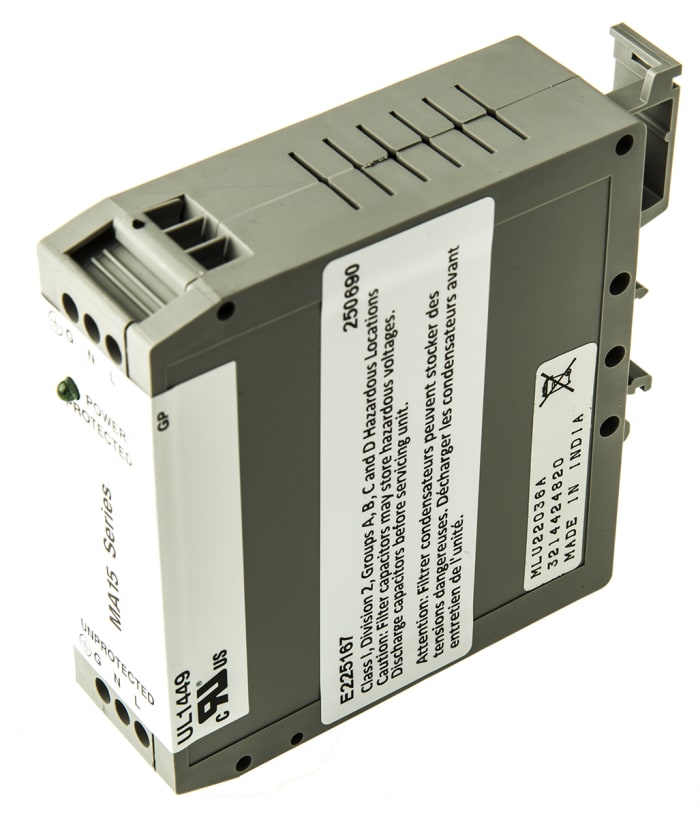Technical Document
Specifications
Brand
WJ FurseSuppressor Type
Low Current Mains Protector
Maximum Voltage Rating
280 V
Mounting Type
DIN Rail
Maximum Surge Current
10kA
Series
ESP 240
Length
120mm
Depth
38mm
Height
54mm
Dimensions
120 x 54 x 38mm
Minimum Operating Temperature
-40°C
Maximum Operating Temperature
+70°C
Country of Origin
United Kingdom
Product details
Overvoltage Protectors for Low Current Mains Supplies
Over Voltage protectors for low current mains power supplies to protect electronic equipment e.g. CCTV cameras, alarm panels and telemetry equipment.
Very low let-through voltage between all lines (L-E, L-N, N-E)
Sturdy housing with M6 earth stud
Removable DIN rail foot for easy installation (unboxed versions). Can also be flat-mounted.
IP66 rated boxed version (/BX parts)
Colour-coded terminals
Weatherproof Enclosures
Tough polycarbonate enclosures
WBX enclosures for ESP protectors provide added protection in damp and dirty environments. Ideal for use when the protectors cannot be installed within an existing equipment panel or enclosure.
Approvals
Network Rail approval (ESP 240-5A/BX) – PA05/02896. NRS PADS ref: 087/037285
Transient Voltage Suppressors (Modules,Industrial)
Voltage surges, often referred to as spikes or transient overvoltages are typically caused by switching of fluorescent lights, fuses blowing or nearby lightning activity. The worst voltage surges are usually caused by lightning activity and can reach up to 6000V, with current surges of up to 3000A. The maximum size of the voltage and current surges depends on the location within the buildings wiring system. BS6651:1999 Annex C which was replaced in August 2008 by BS EN 62305-4:2006 is complemented by BS EN 61643-11/12 and covers location categories and provides guidance on protection of electronic equipment. For mains power systems, Types I, II and III are used. Surge protection devices not designed to fit into these categories may only provide limited protection and the equipment they protect may suffer damage.


EGP 23,502.79
EGP 23,502.79 Each (ex VAT)
1
EGP 23,502.79
EGP 23,502.79 Each (ex VAT)
Stock information temporarily unavailable.
1
Stock information temporarily unavailable.


Technical Document
Specifications
Brand
WJ FurseSuppressor Type
Low Current Mains Protector
Maximum Voltage Rating
280 V
Mounting Type
DIN Rail
Maximum Surge Current
10kA
Series
ESP 240
Length
120mm
Depth
38mm
Height
54mm
Dimensions
120 x 54 x 38mm
Minimum Operating Temperature
-40°C
Maximum Operating Temperature
+70°C
Country of Origin
United Kingdom
Product details
Overvoltage Protectors for Low Current Mains Supplies
Over Voltage protectors for low current mains power supplies to protect electronic equipment e.g. CCTV cameras, alarm panels and telemetry equipment.
Very low let-through voltage between all lines (L-E, L-N, N-E)
Sturdy housing with M6 earth stud
Removable DIN rail foot for easy installation (unboxed versions). Can also be flat-mounted.
IP66 rated boxed version (/BX parts)
Colour-coded terminals
Weatherproof Enclosures
Tough polycarbonate enclosures
WBX enclosures for ESP protectors provide added protection in damp and dirty environments. Ideal for use when the protectors cannot be installed within an existing equipment panel or enclosure.
Approvals
Network Rail approval (ESP 240-5A/BX) – PA05/02896. NRS PADS ref: 087/037285
Transient Voltage Suppressors (Modules,Industrial)
Voltage surges, often referred to as spikes or transient overvoltages are typically caused by switching of fluorescent lights, fuses blowing or nearby lightning activity. The worst voltage surges are usually caused by lightning activity and can reach up to 6000V, with current surges of up to 3000A. The maximum size of the voltage and current surges depends on the location within the buildings wiring system. BS6651:1999 Annex C which was replaced in August 2008 by BS EN 62305-4:2006 is complemented by BS EN 61643-11/12 and covers location categories and provides guidance on protection of electronic equipment. For mains power systems, Types I, II and III are used. Surge protection devices not designed to fit into these categories may only provide limited protection and the equipment they protect may suffer damage.


